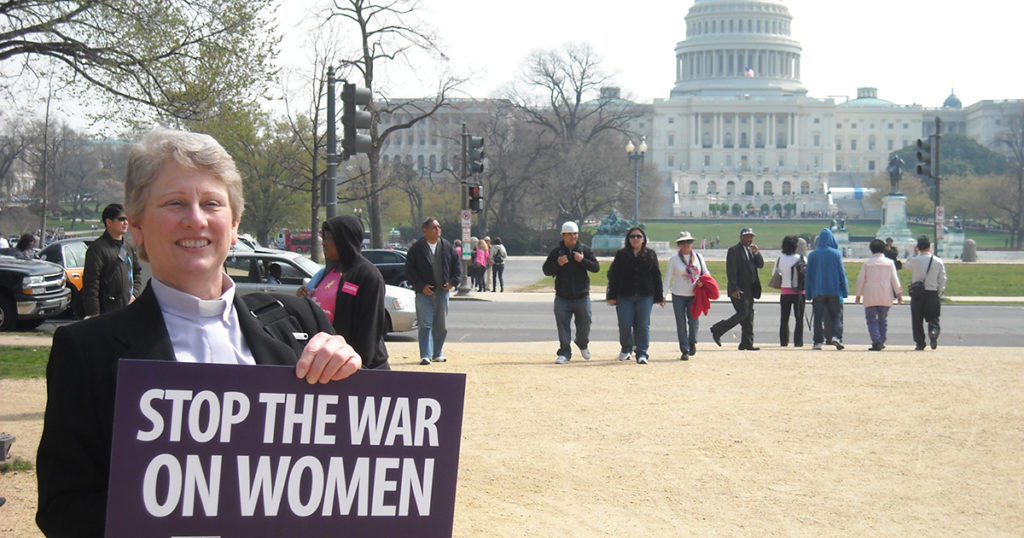Listen to Women. Follow their lead.
 When she left the well after her encounter with Jesus, the Samaritan woman with a somewhat compromising history had been given living water and new life. She returned to her community to testify to what she had witnessed and who she believed she had met. Her neighbors, all Samaritans, went to see for themselves. They, too, were convinced that Jesus was the foretold Messiah.
When she left the well after her encounter with Jesus, the Samaritan woman with a somewhat compromising history had been given living water and new life. She returned to her community to testify to what she had witnessed and who she believed she had met. Her neighbors, all Samaritans, went to see for themselves. They, too, were convinced that Jesus was the foretold Messiah.
We know how Jesus broke down barriers of cultural, social and religious tradition and how he turned over not only the tables in the temple but also homegrown tables which assigned to women specific and subservient roles. The Samaritan woman was at first shocked that Jesus had even asked her for a drink water since Jews were not supposed to interact with Samaritans. And then she was stunned that he saw right through her and still offered to her the word and grace of God. Time and time again, Jesus approached women with respect, annoying his male disciples who thought they were all that and more, and disrupted preconceived notions of who women were supposed to be.
The early Christian church – as in the really early church – included women who were leaders, organizers and preachers in the movement as the Good News began to be shared more broadly and spread geographically. But the weight of the prevalent patriarchal culture soon silenced and subsumed many of these women as men took control and shaped the trajectory of the church. So it is not surprising to also read that once the Samaritans encountered Jesus for themselves, “They said to the woman, ‘It is no longer because of what you said that we believe, for we have heard for ourselves, and we know that this is truly the Savior of the world.’” (John 4:42) Does this also ring a bell when you think about the women who were the first witnesses to the resurrection who also were not believed?
Fast forward to the 21st century. So much has been changed for women today as a result of centuries of advocacy, education and effort that we are stunned when we encounter sexism in its overt and not-so-obvious forms. The current legislative climate threatens to reinstate more controls over women’s bodies, access to education and job training, and ability to live in safe and secure communities.
For decades, the United Church of Christ has worked diligently to support legislation and efforts to address and prevent violence against women (the Violence Against Women Act, for example), equal pay for women, access to contraception and full reproductive health care, programs to end human trafficking (which disproportionately affects women and children), supplemental food programs for families, and so much more. Through multiple actions of the General Synod where these issues received full debate and consideration, we have said repeatedly that women are to be believed when they identify the things that are good for their lives and the lives of their families.
Now we are faced with going backwards. A flurry of Executive Orders has already eliminated federal funding for international family planning programs (PEPFAR) and legislation will soon be on the scene to cut all funding for Planned Parenthood even though current law already prohibits the use of federal funds for abortion. Women and men who rely on local PP clinics for basic health care will suffer. Programs that are mistakenly called “entitlements” may also be cut – temporary assistance for needy families, school lunch nutritional requirements, and, lest we forget, the deconstruction of the Affordable Care Act which has provided health insurance for millions of women and children previously not covered.
During Black History Month, the US Postal Service released a stamp honoring Dorothy Height, long-time activist for civil and women’s rights and founder of the National Council of Negro Women. This well-deserved honor could also be recognized for Women’s History Month. Ms. Height’s ability to bring the voices of women to the forefront of social movements and her fierce support for legislation that protected women most marginalized by society is legendary. Her passion grew from her faith, just as the UCC’s passion and commitment to justice for women flows from our faith.
The doors that Jesus opened were often slammed shut, so it is up to us to find them again, open them and keep them open. It has often been said that the health of a society can be measured by the health and well-being of its women and children. While many of us are thriving relatively speaking, a great many of our sisters are not. Legislation that will make it more difficult for women to shape and live the lives they dream of must not be allowed to pass.
Women know what is best for themselves. Believe them when they tell you what is best. Listen to women. Follow their lead.
Rev. Loey Powell, recently retired, former JWM staff with responsibility for justice for women issues.
Related News
Leading with Love in 2025
This new year brings us a new Congress, new administration, and new political landscape across...
Read MoreThe Best Government Money Can Buy
In our democracy, every person eligible to vote has the same number of votes as everyone else...
Read MoreHolding Space for Grief and Hope After the 2024 Election
Beloveds, for many the results of the US election are a devastating departure from the just...
Read More
